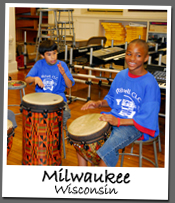As the hub of the American socialist movement in the first half of the 20th century, Milwaukee, Wisconsin led the nation in devising practical approaches to delivering government services. In 1911, a revolutionary law gave the local public school system responsibility for providing a recreation program. The city created the Milwaukee Recreation (the Milwaukee Public Schools Department of Recreation and Community Services) to satisfy the law, and charged the agency with providing a safe and enriching place for Milwaukee Public School students to go when the school day ended. Milwaukee Recreation continued this tradition throughout the century, and in 1998, 11 inner-city, high-poverty, high-crime Milwaukee Public Schools received 21st Century Community Learning Centers (CCLC) grants, each worth $120,000. At the time, Milwaukee was a community in desperate need of safe and supportive environments for local children in the afternoon. Some 87 percent of the students lived at or below the poverty level, 60 percent of families were headed by single parents, and 79 percent of students were on free or reduced lunches. With 98,000 students, Milwaukee’s is one of the largest school systems in the nation, and Milwaukee Recreation faced a similarly huge task. But since 1998, with the help of the 21st CCLC, Milwaukee Recreation has made enormous strides. It now serves more than 13,000 students per day, up from 3,100 at the time of the original 1998 grants. By fall of 2008, the program had expanded to 55 sites, five times as many as the original grant served. Serving youth in grades K-12, the program is now more academically-focused, offering tutoring, homework help, test score improvement and social and recreational activities. The district is very supportive, and the program continues to receive school board funds, including money directed towards enhancing wellness. In addition, each site is required to have a community partner, which strengthens each program’s relationship with the surrounding neighborhood and allows the programs to take advantage of the diverse resources within their communities. 21st CCLC supervisor Brian Litzsey expresses the sentiment of many afterschool providers when he says Milwaukee Recreation is really trying to make afterschool available to all kids who need it. Litzsey believes the 21st CCLC has really helped afterschool programs evolve into important and much-needed institutions. “I think the presence of 21st CCLC in the Milwaukee community has shaped the landscape of afterschool programs,” he says. “No longer are afterschool programs just thought of as glorified babysitting; they now are viewed as tools to help students and their families explore educational and recreational opportunities outside of the normal school day. If think that there would have been thousands of students and their families who would never had the opportunity to improve both their educational and social development.” EDITOR'S NOTE: Milwaukee was one of the first communities to be awarded a 21st Century Community Learning Center grant to support its afterschool programs. The federal 21st Century Community Learning Centers initiative has just marked 10 years of supporting community afterschool programs. Today, it remains the only federal funding source dedicated to afterschool programs. |








